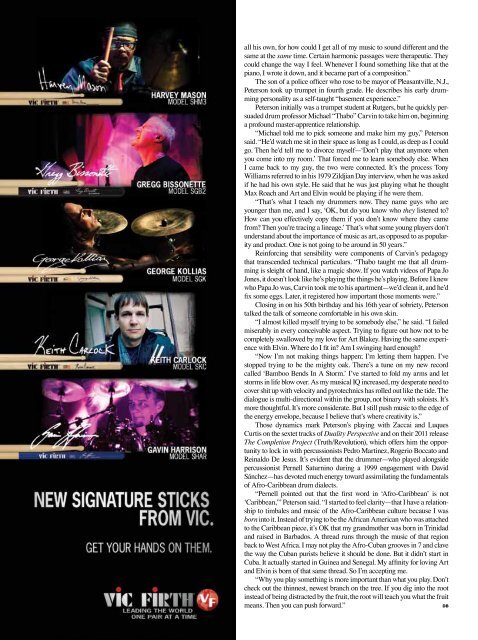Ralph Peterson 35th Annual Student Music Awards - Downbeat
Ralph Peterson 35th Annual Student Music Awards - Downbeat
Ralph Peterson 35th Annual Student Music Awards - Downbeat
Create successful ePaper yourself
Turn your PDF publications into a flip-book with our unique Google optimized e-Paper software.
all his own, for how could I get all of my music to sound different and the<br />
same at the same time. Certain harmonic passages were therapeutic. They<br />
could change the way I feel. Whenever I found something like that at the<br />
piano, I wrote it down, and it became part of a composition.”<br />
The son of a police officer who rose to be mayor of Pleasantville, N.J.,<br />
<strong>Peterson</strong> took up trumpet in fourth grade. He describes his early drumming<br />
personality as a self-taught “basement experience.”<br />
<strong>Peterson</strong> initially was a trumpet student at Rutgers, but he quickly persuaded<br />
drum professor Michael “Thabo” Carvin to take him on, beginning<br />
a profound master-apprentice relationship.<br />
“Michael told me to pick someone and make him my guy,” <strong>Peterson</strong><br />
said. “He’d watch me sit in their space as long as I could, as deep as I could<br />
go. Then he’d tell me to divorce myself—‘Don’t play that anymore when<br />
you come into my room.’ That forced me to learn somebody else. When<br />
I came back to my guy, the two were connected. It’s the process Tony<br />
Williams referred to in his 1979 Zildjian Day interview, when he was asked<br />
if he had his own style. He said that he was just playing what he thought<br />
Max Roach and Art and Elvin would be playing if he were them.<br />
“That’s what I teach my drummers now. They name guys who are<br />
younger than me, and I say, ‘OK, but do you know who they listened to?<br />
How can you effectively copy them if you don’t know where they came<br />
from? Then you’re tracing a lineage.’ That’s what some young players don’t<br />
understand about the importance of music as art, as opposed to as popularity<br />
and product. One is not going to be around in 50 years.”<br />
Reinforcing that sensibility were components of Carvin’s pedagogy<br />
that transcended technical particulars. “Thabo taught me that all drumming<br />
is sleight of hand, like a magic show. If you watch videos of Papa Jo<br />
Jones, it doesn’t look like he’s playing the things he’s playing. Before I knew<br />
who Papa Jo was, Carvin took me to his apartment—we’d clean it, and he’d<br />
fix some eggs. Later, it registered how important those moments were.”<br />
Closing in on his 50th birthday and his 16th year of sobriety, <strong>Peterson</strong><br />
talked the talk of someone comfortable in his own skin.<br />
“I almost killed myself trying to be somebody else,” he said. “I failed<br />
miserably in every conceivable aspect. Trying to figure out how not to be<br />
completely swallowed by my love for Art Blakey. Having the same experience<br />
with Elvin. Where do I fit in? Am I swinging hard enough?<br />
“Now I’m not making things happen; I’m letting them happen. I’ve<br />
stopped trying to be the mighty oak. There’s a tune on my new record<br />
called ‘Bamboo Bends In A Storm.’ I’ve started to fold my arms and let<br />
storms in life blow over. As my musical IQ increased, my desperate need to<br />
cover shit up with velocity and pyrotechnics has rolled out like the tide. The<br />
dialogue is multi-directional within the group, not binary with soloists. It’s<br />
more thoughtful. It’s more considerate. But I still push music to the edge of<br />
the energy envelope, because I believe that’s where creativity is.”<br />
Those dynamics mark <strong>Peterson</strong>’s playing with Zaccai and Luques<br />
Curtis on the sextet tracks of Duality Perspective and on their 2011 release<br />
The Completion Project (Truth/Revolution), which offers him the opportunity<br />
to lock in with percussionists Pedro Martinez, Rogerio Boccato and<br />
Reinaldo De Jesus. It’s evident that the drummer—who played alongside<br />
percussionist Pernell Saturnino during a 1999 engagement with David<br />
Sánchez—has devoted much energy toward assimilating the fundamentals<br />
of Afro-Caribbean drum dialects.<br />
“Pernell pointed out that the first word in ‘Afro-Caribbean’ is not<br />
‘Caribbean,’” <strong>Peterson</strong> said. “I started to feel clarity—that I have a relationship<br />
to timbales and music of the Afro-Caribbean culture because I was<br />
born into it. Instead of trying to be the African American who was attached<br />
to the Caribbean piece, it’s OK that my grandmother was born in Trinidad<br />
and raised in Barbados. A thread runs through the music of that region<br />
back to West Africa. I may not play the Afro-Cuban grooves in 7 and clave<br />
the way the Cuban purists believe it should be done. But it didn’t start in<br />
Cuba. It actually started in Guinea and Senegal. My affinity for loving Art<br />
and Elvin is born of that same thread. So I’m accepting me.<br />
“Why you play something is more important than what you play. Don’t<br />
check out the thinnest, newest branch on the tree. If you dig into the root<br />
instead of being distracted by the fruit, the root will teach you what the fruit<br />
means. Then you can push forward.” DB

















